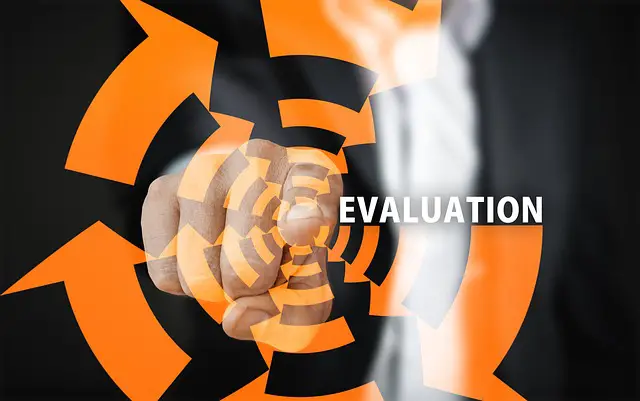When you assess something, you make a judgement about it. This could be your own judgement, or the judgement of someone else. For example, you might assess a situation to be dangerous, or a person to be trustworthy. When you evaluate something, you examine it in order to make a judgement about it. This is usually done in a more systematic way than simply making a judgement. For example, you might evaluate the safety of a car by looking at its crash test rating.
Definition of evaluate
(Image by Gerd Altmann from Pixabay )

The term “evaluate” means to assess, judge, or determine the value, worth, or quality of something or someone. It involves examining, analyzing, and making a judgment about the strengths and weaknesses, advantages and disadvantages, or the overall effectiveness of a particular object, idea, or concept. Evaluation can be done in various contexts, such as in education, business, research, or personal development, and can involve quantitative or qualitative analysis, or a combination of both.
Definition of assess
(Photo by Glenn Carstens-Peters on Unsplash )

The term “assess” means to evaluate, estimate, or measure the value, quality, or significance of something or someone. It involves collecting and analyzing information or data to make informed judgments or decisions. Assessment can be done in various contexts, such as in education, healthcare, business, or government, and can involve both subjective and objective criteria. Assessment can be used to identify strengths and weaknesses, to provide feedback or guidance, or to make decisions based on the information gathered.
Evaluate Vs. Asses – Key differences
While there is some overlap in the meanings of “evaluate” and “assess”, there are some key differences between the two terms:
Scope: “Evaluate” typically involves a broader scope, examining the overall effectiveness or value of something, while “assess” can be more specific, focusing on a particular aspect or attribute.
Criteria: “Evaluate” often involves applying subjective criteria such as personal opinion or judgment, while “assess” tends to use more objective criteria such as established standards or data analysis.
Purpose: “Evaluate” often implies making a judgment or decision based on the assessment, while “assess” may be done for the purpose of gathering information or feedback.
Context: “Assess” is often used in more formal or professional contexts, such as education or healthcare, while “evaluate” may be used more broadly, including in personal or informal settings.
“Assess” tends to be more focused on gathering information, while “evaluate” involves a more comprehensive analysis and judgment.
How to use each word correctly
Both “evaluate” and “assess” can be used to describe the process of examining or analyzing something or someone. Here are some guidelines for using each word correctly:
“Evaluate” is often used when making a judgment about the quality, effectiveness, or value of something. For example:
- The teacher will evaluate the students’ performance based on their test results.
- The company will evaluate the effectiveness of its marketing campaign using data analysis.
“Assess” is often used when collecting information or data to make a decision or provide feedback. For example:
- The doctor will assess the patient’s symptoms to make a diagnosis.
- The coach will assess the team’s performance during practice to provide feedback on areas for improvement.
When using either word, it’s important to be clear about the purpose and context of the evaluation or assessment. For example, in education, “assess” is often used when referring to formative assessments that provide feedback to students on their learning progress, while “evaluate” may be used for summative assessments that determine a final grade or level of achievement.
Consider the scope of the evaluation or assessment. If you want to examine a specific aspect or attribute, “assess” might be a better choice, while if you want to provide an overall judgment or evaluation, “evaluate” might be more appropriate.
Ultimately, the choice between “evaluate” and “assess” will depend on the specific context and purpose of the analysis or examination.
What is the difference between assess and evaluate in research?
In research, “assess” and “evaluate” can have slightly different meanings depending on the specific context. Generally, “assess” is often used to describe the process of collecting and analyzing data or information to better understand a phenomenon, while “evaluate” is used to describe the process of determining the value or quality of something, often based on specific criteria or standards.
Here are some examples of how each term might be used in research:
- “Assess”: In a study on the effects of a new drug, researchers might assess the drug’s effectiveness by collecting and analyzing data on patients’ symptoms and medical outcomes.
- “Evaluate”: In a systematic review of existing research studies, researchers might evaluate the overall quality and relevance of each study to determine whether it provides strong evidence on a particular topic.
In some cases, the two terms can be used interchangeably. For example, researchers might use “assess” or “evaluate” to describe the process of examining the validity or reliability of a research measure or instrument.
The choice between “assess” and “evaluate” in research will depend on the specific context and purpose of the analysis or examination. It’s important to be clear about the goals and criteria for the study or analysis to ensure that the appropriate term is used.
What is the difference between assessment and evaluation essay?
The terms “assessment essay” and “evaluation essay” can sometimes be used interchangeably, but there are some differences between the two that are worth noting.
An assessment essay is typically an analysis of a particular subject, such as a work of literature or a historical event, with a focus on understanding its various components, aspects, and significance. An assessment essay may involve a detailed examination of the subject, including its strengths and weaknesses, its historical or cultural context, and its broader implications.
On the other hand, an evaluation essay typically involves a more specific judgment about the quality or value of something, such as a product, service, or performance. An evaluation essay might include an analysis of specific criteria, such as effectiveness, cost, or impact, and a comparison with other similar products or services.
What is the concept of assessment and evaluation?
Assessment and evaluation are two related concepts that are often used in education, healthcare, business, and other fields to gather information, make decisions, and improve performance.
Assessment refers to the process of collecting and analyzing data or information to better understand a particular situation or phenomenon. Assessment can be done for many different purposes, such as determining a student’s learning progress, diagnosing a patient’s health condition, or evaluating the effectiveness of a business strategy. Assessment can involve a range of methods, such as tests, observations, surveys, and interviews, and can be both quantitative and qualitative in nature.
Evaluation, on the other hand, refers to the process of making judgments or decisions based on the results of an assessment. Evaluation involves comparing the data or information gathered during assessment to established criteria or standards, and making a determination about the quality, effectiveness, or value of a particular subject or situation. Evaluation can be used to inform decision-making, provide feedback or guidance, or determine the overall success of a program, initiative, or project.
Assessment and evaluation are complementary processes that are used to gather and analyze information in order to make informed decisions and improve performance. While assessment focuses on collecting data, evaluation focuses on making judgments and decisions based on that data. Both assessment and evaluation are essential components of effective decision-making and continuous improvement in many different contexts.
What is the importance between assessment and evaluation?
Assessment and evaluation are both important processes that help individuals, organizations, and communities make informed decisions, improve performance, and achieve their goals. Here are some of the key reasons why assessment and evaluation are important:
- They help identify strengths and weaknesses: Assessment and evaluation provide important information about what is working well and what needs improvement in a particular situation. This information can be used to guide decision-making, prioritize resources, and make targeted improvements.
- They provide feedback and guidance: Assessment and evaluation can provide valuable feedback to individuals, organizations, and communities about their performance, progress, and achievements. This feedback can be used to make adjustments, set goals, and develop action plans for improvement.
- They support accountability: Assessment and evaluation help to establish clear expectations and standards for performance, and provide evidence of progress and success. This can help to hold individuals, organizations, and communities accountable for their actions and outcomes.
- They inform decision-making: Assessment and evaluation provide important information that can be used to make informed decisions about resource allocation, program design, and policy development. This information can help to ensure that decisions are evidence-based and have a higher likelihood of success.
- They facilitate continuous improvement: Assessment and evaluation provide a structured process for continuous learning, reflection, and improvement. By regularly assessing and evaluating their performance, individuals, organizations, and communities can identify areas for improvement, set goals, and continuously work towards achieving better outcomes.
Assessment and evaluation are important processes that can help individuals, organizations, and communities achieve their goals, improve performance, and make informed decisions.








